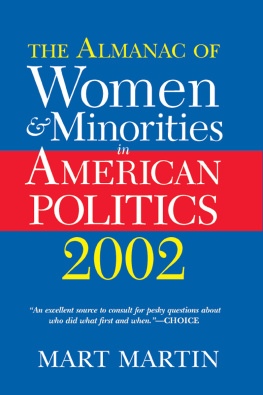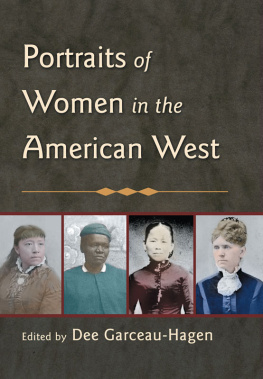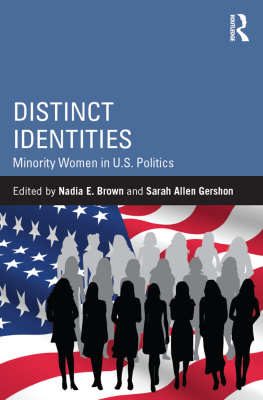THE ALMANAC OF WOMEN AND MINORITIES IN AMERICAN POLITICS
2002
THE ALMANAC OF WOMEN AND MINORITIES IN AMERICAN POLITICS
2002
Mart Martin
foreword by
Paula D. McClain
Authors Note
The author and editors of this work have added value to the underlying factual material herein through one or more of the following: unique and original selection; coordination; presentation; expression; arrangement; and classification of the information.
First published 2001 by Westview Press
Published 2018 by Routledge
711 Third Avenue, New York, NY 10017, USA
2 Park Square, Milton Park, Abingdon, Oxon OX14 4RN
Routledge is an imprint of the Taylor & Francis Group, an informa business
Copyright 2001 Taylor & Francis
All rights reserved. No part of this book may be reprinted or reproduced or utilised in any form or by any electronic, mechanical, or other means, now known or hereafter invented, including photocopying and recording, or in any information storage or retrieval system, without permission in writing from the publishers.
Notice:
Product or corporate names may be trademarks or registered trademarks, and are used only for identification and explanation without intent to infringe.
Library of Congress Cataloging-in-Publication Data
Martin, Mart, 1944-
The almanac of women and minorities in American politics 2002 / Mart Martin ; forward by Paula D. McClain.
p. cm.
Includes bibliographical references and index.
ISBN 0-8133-9817-7 (paper)
1. Women in politicsUnited StatesHandbooks, manuals, etc. 2. Women politiciansUnited StatesHandbooks, manuals, etc. 3. MinoritiesUnited StatesPolitical activityHandbooks, manuals, etc. 4. GaysUnited StatesPolitical activityHandbooks, manuals, etc. I. Title.
HQ1236.5.U6 M3779 2001
305.433290973dc21
2001026228
ISBN 13: 978-0-8133-9817-4 (pbk)
Design by Heather Hutchison
Dedicated to
Martin Clifton, Audra Clifton, Michael Tran, Bonnie Yen,
Bryant Tran, Brandon Tran, Darren Yen
Contents
by Paula D. McClain
Alexis de Tocqueville, an early French visitor to the United States who wrote Democracy in America (1835), believed that the essence of America was the uniquely free and egalitarian ideas that abounded at the founding. Nonetheless, de Tocqueville noted that the treatment of blacks and Indians in the United States contradicted the American passion for democracy. Despite the universality of the language used by the founders in the documents they produced, they did not intend for these concepts to be universally applied. When Thomas Jefferson, in the Declaration of Independence, wrote the words All men are created equal, he should have added an asterisk with a note that read, Does not apply to American Indians, blacks, and white women residing in the new nation. As a result of this initial exclusion of a majority of the American population, the political history of the United States has been the struggle of a polity to make accurate the words of Jefferson. As a student of American politics, I have always taken the position that one cannot truly understand the American political system without also understanding the politics of those groups initially excluded from participation in the system.
Despite the growing importance and volume of scholarship on the politics of African Americans, Latinos, Asian Americans, American Indians, and women of all colors, oftentimes we are unable to reconstruct easily the political histories of these groups. More often, we are unable to answer such specific questions as: 1) Who was the first black American nominated for a statewide office in the United States? 2) What was the first state to grant women the right to vote? 3) When was the first Latina (female) elected to a state legislature in the United States? or 4) Who was the first Asian American woman to vote in a presidential election and in what year? Although we know the answers to these questions exist, we also know that finding them requires many hours in the library. Not anymore!
The Almanac of Women and Minorities in American Politics is the reference book students of American politics in general and those who study the politics of women and racial minorities have needed for years. In addition to historical information, it provides detailed data not readily available anywhere else. Moreover, the Gays and Lesbians in American Politics section highlights the intersection of race, gender, and sexual identity for several political firsts. Mart Martin and his colleagues provide a valuable service with this volume, one I plan to draw heavily on, especially when it is time for the third edition of Can We All Get Along? Racial and Ethnic Minorities in American Politics, Second Edition (Westview, 1998). This volume also means we will no longer dread those important, yet difficult questions to answer. By the way, the answers to the questions posed earlier are: 1) Frederick Douglass, 1855 in New York; 2) New Jersey in 1776; 3) Fedelina Lucero Gallegos, 1930 in New Mexico; and 4) Tye Leung, 1912 in San Francisco.
PAULA D.MCCLAIN
UNIVERSITY OF VIRGINIA
The following chart (by state) details the total number of women who have served their states in three of the most powerful positions in U.S. politics: governor, U.S. Senate (both appointed and elected), and U.S. House of Representatives.
State | Governor | U.S. Senate | U.S. House |
Alabama | | | |
Alaska | - | - | - |
Arizona | | - | |
Arkansas | - | | |
California | - | | |
Colorado | - | - | |
Connecticut | | - | |
Delaware | | - | - |
Florida | - | | |
Georgia | - | | |
Hawaii | - | - | |
Idaho | - | - | |
Illinois | - | | |
Indiana | - | - | |
Iowa | - | - | - |
Kansas | | | |
Kentucky | | - | |
Louisiana | - | | |
Maine | - | | |
Maryland | - | | |
Massachusetts |












